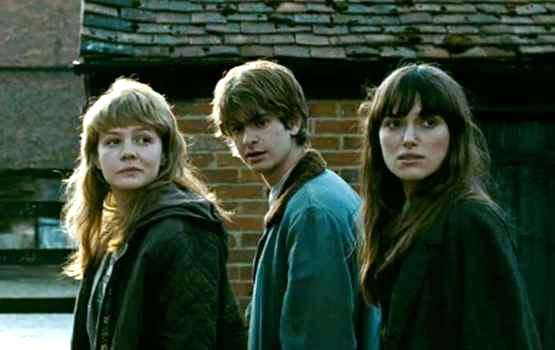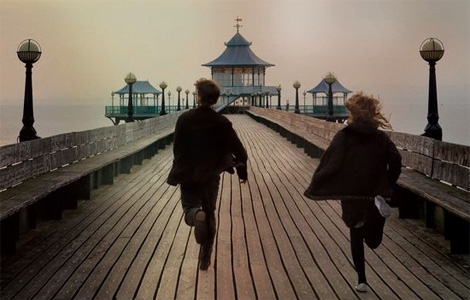
I know it’s becoming a habit ’round here to kick off movie reviews by apologizing for their lateness. But — sorry, y’all — this one’s running a few weeks behind also. (Suffice to say, work’s been busy of late, and will likely remain so until election day.) Nonetheless, since I’ve now got five recently-seen movies kicking around in the to-be-reviewed hopper…
I haven’t read the original novel — which was chosen as one of TIME’s top 100 books of (most of) the 20th century — but I’m guessing that Mark Romanek’s adaptation of Kazuo Ishigoro’s Never Let Me Go is probably pretty faithful to its source material. A sparing, muted, and low-key affair throughout, this is basically a Merchant Ivory science-fiction film, and, much like the butler in Ishigoro’s The Remains of the Day, the movie is a model of delicate — some might even say pained — restraint. That, ultimately, is its strength and its weakness.
To be honest, I found Never Let Me Go rather slow-moving for its first two-thirds, and I have some issues with the basic storytelling here — Much like Cormac McCarthy’s The Road, I suspect the book may just be “top-shelf” sci-fi for artsy lit-crit types who think regular genre sci-fi is for dweebs. (I could very well be wrong, of course — Like I said, I haven’t read it.) Still, I wouldn’t go far as to call it haunting, but Romanek’s film has burbled back into mind several times in the weeks since I saw it (and not just because I’ve already seen Carey Mulligan and Andrew Garfield in separate outings since.)
Set in an alternate England not too dissimilar in dystopic drabness from the one in Alfonso Cuaron’s Children of Men, Never Let Me Go begins amid the halls and fields of Hailsham, a country boarding school headed by the always-striking presence of Charlotte Rampling (recently of Life during Wartime.) The name of the school, like Rampling’s character, is reminiscent of Miss Havisham of Great Expectations, and there’s certainly a Dickensian feel to this first third of the story, where events are set in motion that will redound over the course of our protagonists’ lifetimes. (I’m probably overthinking things, tho’. Hailsham is also just the name of the town.)
In any case, although possessing none of the colorful antics or magickal je-ne-sais-quoi of Hogwarts, Hailsham too is a school for very special children. Here, a young girl named Kathy (Isobel Meikle-Small), her friend and rival Ruth (Ella Purnell), and Tommy (Charlie Rowe), the strange, vaguely feral lad they both take a shining to, come of age. Wearing wrist monitors wherever they go and deeply fearful of leaving the school grounds, the children are nonetheless heavily trained in the etiquette of the outside world. They are also encouraged to create art — art which is closely monitored by the powers-that-be. But for what, exactly? What is going on with these kids? Only when one of the younger teachers (Sally Hawkins) experiences a twinge of conscience over her students are we clued in to the real goings-on.
Cut to several years later, and our trio — now fully cognizant of their special purpose –has grown into Carey Mulligan (good, but, as in An Education and Wall Street 2, doing the world-weary-with-dimples thing that’s fast becoming her trademark), Keira Knightley (actually kinda terrible — as in The Jacket, she just twitches and twitters to signify emotion — it’s very possible she just can’t act), and Andrew Garfield (with Parnassus, Red Riding, and The Social Network, having a breakout year, but the part is unfortunately a bit Rain Man-y. He does have one amazing scene with Rampling late in the film, tho.)
I can’t say anymore really without giving away the game, other than that the earlier-established love triangle dominates the second part of Never Let Me Go, and the inevitable implications of this trio’s special-ness comes to the fore in the third and most satisfying section of the film. But this final forty minutes or so, while no doubt the best part of the flick, poses problems for the movie as a whole.
The minor, more quibble-ly concern, and one I’m willing to concede for the sake of the overarching theme — we are mortal, and death ineluctable, so use your time well — is that the characters all seem rather resigned to their fates here. Granted this is a civilization accustomed to queueing, that some here do attempt one gambit to buy some time, and that we don’t really need an Americanized action movie version of this story anyway — Bayhem already made it. Still, the fact that a Logan’s Run-type alternative isn’t even suggested at any point highlights some of the overall story flaws here. (In fact, the whole idea of the school doesn’t really make sense, when you get down to it.)
But, you know, in any sci-fi story, you have to take certain basic premises for granted, so I can run with that. The bigger problem here is that a full two-thirds of the movie are spent tracing out a love triangle that barely reaches soap opera levels of sophistication, and one that only holds together at all because two of the parties are as passive as Stevens the Butler about the way they feel. Yes, the ending is haunting in its own way (if a bit overwritten; The final monologue pretty much tries to punch you in the face with the subtext, just in case you missed it.) But why did we have to sit through an hour of Knightley biting her lip or Mulligan third-wheeling it to get to this point?
I don’t want to sound too harsh about this movie, because, overall, I’d say it’s worth seeing, and it has some moments of quiet power. (Like I said, there’s a scene with Rampling, Garfield, and Mulligan over tea near the end that’s a showstopper.) But, partly because the characters in this world are so clipped and distant, and mainly because the love story here is never as interesting as the world it takes place in, I didn’t find Never Let Me Go as gripping in the end as either the hype or the title would imply.


I enjoyed the movie but was also irked by why the characters didn’t at least consider trying to cut off their wristbands (or their hands if need be). Read the book a few days ago to see if the issue was ever addressed. It isn’t, and gotta say despite its flaws, the movie was a huge improvement on the book.
You sound pretty dead-on as usual (and I think the movie looks beautiful but probably moves too slowly for most folks), but I do want to throw in a defense of the book here. I’m a card-carrying sci-fi dweeb, as you know, and I enjoyed it as both literature and genre fiction, for what that’s worth.
Sounds like one vote for the book and one vote against. Anyone want to break the tie?
I loved the book- it’s slow and subtle but hooks you in and leaves you thinking about it for days after finishing. It’s also one of the best examples I can think of a male author who writes with a believable female voice.
another vote for the book. it is moody, subtle and “haunting” definitely. worth reading. haven’t seen the film yet, so checked out your review. thanks kevin.